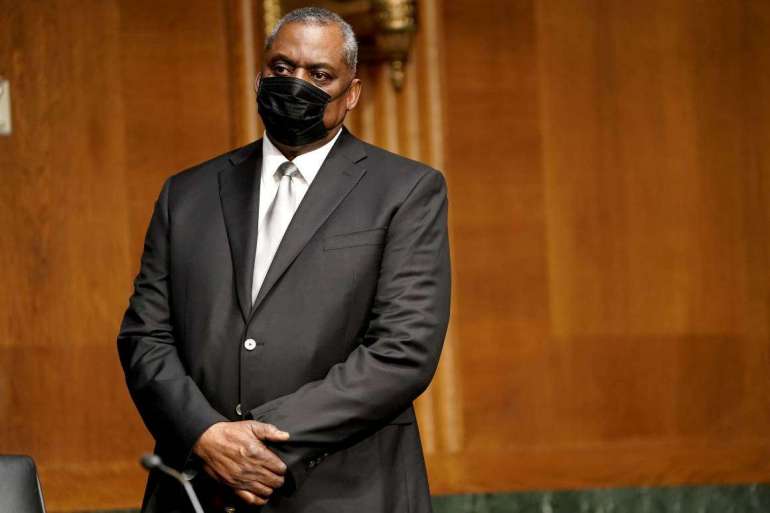Lloyd Austin pledges ‘competent civilian control’ of the military as defense secretary

Austin said he would keep lawmakers in the loop and respect congressional oversight, a major point of contention across both parties.
“If you confirm me, I can assure you the Pentagon under my leadership will respect your oversight responsibilities. We will be transparent with you,” he said. “I will provide you my best counsel. And I will seek yours.”
But his commitments to bolster civilian control didn’t sway one of the top defense hawks on the panel.
Arkansas Republican Tom Cotton, who had voiced concerns about the appointment of a retired general to the post, announced during the hearing that he would oppose a waiver for Austin.
“I believe Congress should no longer grant such waivers at all,” Cotton told Austin. “Under no foreseeable circumstances can I imagine supporting such a waiver again.”
Cotton called his support for a waiver for Mattis in 2017 a “mistake.” He argued that approving a waiver for Austin would reinforce the move as routine rather than a once-in-a-generation exception and could politicize the military and create the perception that military expertise is equivalent to broader national security expertise.
The concerns are bipartisan. Several Democrats who opposed a waiver for Mattis in 2017 have the same stance for Austin — including Sens. Elizabeth Warren of Massachusetts, Tammy Duckworth of Illinois and Richard Blumenthal of Connecticut.
Several Republicans also said they would back Austin. Sen. Dan Sullivan (R-Alaska) introduced Austin at the hearing and brushed off concerns about throwing civil-military relations off kilter. Outgoing Armed Services Chair Jim Inhofe (R-Okla.) and Sen. Mike Rounds (R-S.D.) also said they’d back a waiver.
“I think the tie goes to the president,” Rounds told Austin, arguing the Senate should largely defer to the president-elect on his Cabinet choices.
Ethics and industry ties: Austin committed to recuse himself from any decisions that affect Raytheon Technologies for four years, the full length of Biden’s term and well beyond the one year he agreed to as part of an agreement recently released by the Office of Government Ethics.
“What you’ve asked goes beyond what’s required by law,” Austin told Warren, who pressed him on his recusal. “I’m making this commitment because I recognize the unique circumstances here that you’ve highlighted.”
“Raytheon is one of the world’s largest defense contractors and I’m sensitive to the appearance, concerns that you raised in this particular situation,” he said.
Austin has been a board member since 2016, having served on the board of directors of United Technologies before it merged with Raytheon last year. His industry ties were thought to be a potential hurdle in his confirmation process.
Warren also pressed Austin on whether he would seek a waiver to his recusal and whether he’d seek employment in defense industry or as a lobbyist after leaving the Pentagon.
Austin stopped short of committing to never seek a waiver, but told Warren that he doesn’t expect to request one and would “consider available alternatives to a waiver before seeking one” if the need arose. He also predicted that he won’t seek employment in defense industry later.
“I do not intend to seek employment as a lobbyist or sit on the board of a defense contractor like Raytheon after my service. Quite frankly, I’ll be too old to sit on the board of a defense contractor after my service.”
Warren praised Austin and said his pledge “sends a powerful message” that the retired general isn’t beholden to the defense industry.
Warren, an industry critic, slammed former Defense Secretary Mark Esper, a former Raytheon lobbyist, during his confirmation hearing for not extending his recusal or ruling out future industry employment.
Transgender troops: Austin also announced that he supports Biden’s plan to roll back Trump’s restrictive transgender troop policy and return to the Obama-era doctrine that allows transgender people to serve openly in the military. Biden has pledged to overturn the ban on day one of his presidency.
“I support the president’s plan to overturn the ban,” Austin told Sen. Kirsten Gillibrand (D-N.Y.).
“I truly believe … that if you’re fit and you’re qualified to serve and you can maintain the standards you should be allowed to serve,” he said. “And you can expect that I will support that throughout.”
Pandemic response: Austin called the coronavirus pandemic “the most immediate” challenge to the country and to quickly scrub the Defense Department’s efforts to respond to the virus.
“If confirmed, I will quickly review the department’s contributions to coronavirus relief efforts, ensuring we are doing everything we can to help distribute vaccines across the country and to vaccinate our troops and preserve readiness,” he said.
Extremism in the ranks: Austin, who would be the first Black defense secretary, also promised to combat racism, extremism and sexual assault in the ranks.
His pledge comes after insurrectionists in support of Trump breached the Capitol to halt the official certification of Biden’s victory. The attack resulted in five deaths, including a U.S. Capitol Police officer.
In the wake of the riot, lawmakers have pressed defense and military leaders to address extremism in the ranks after multiple former military personnel were found to have taken part. Austin pledged on Tuesday to fight to “stamp out” racism, extremism and sexual assault in the military.
“We also owe our people a working environment free of discrimination, hate and harassment,” he said. “The job of the Department of Defense is to keep America safe from our enemies. But we can’t do that if some of those enemies lie within our own ranks.”